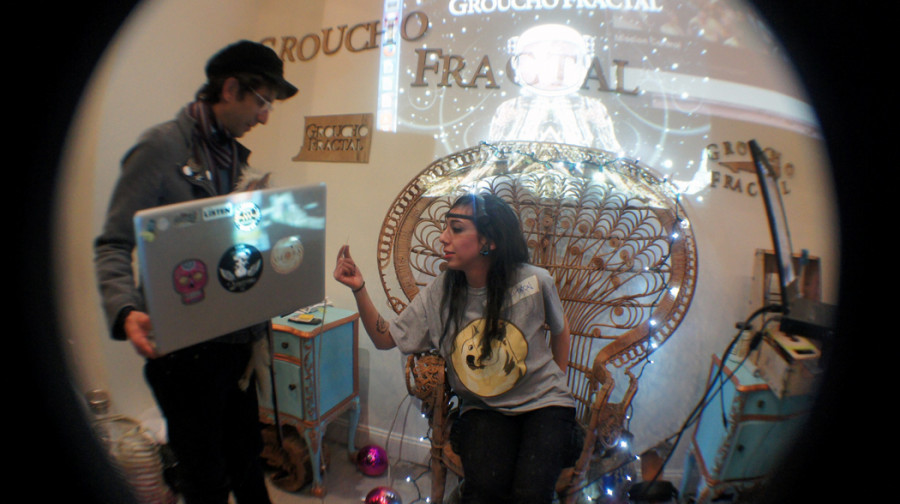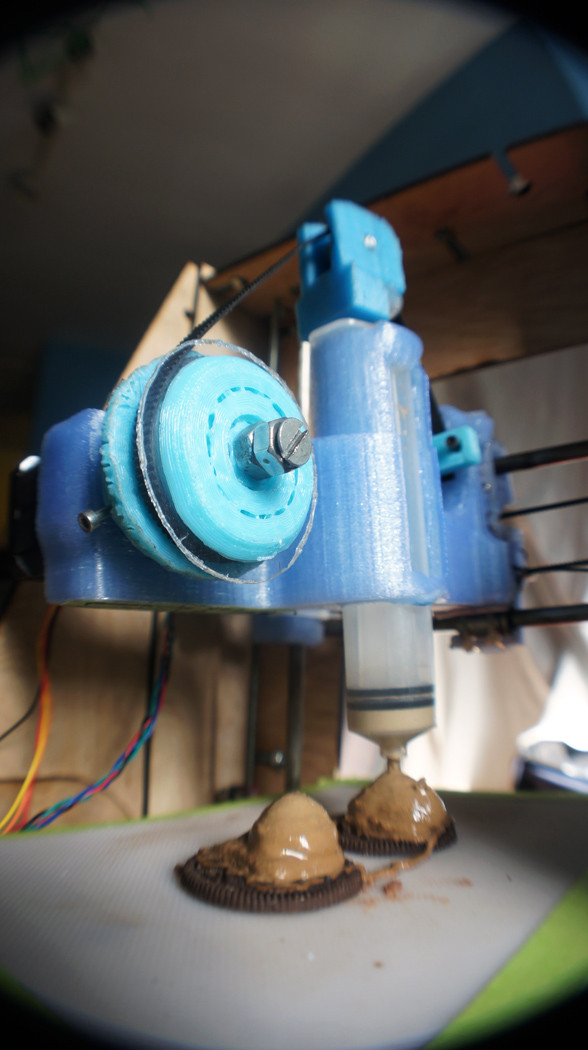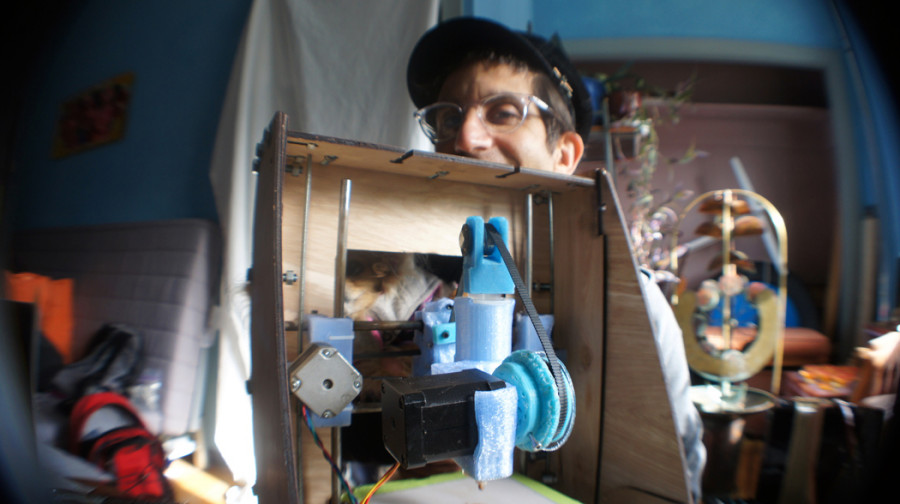Print Out Sustainability
The Groucho Fractal Show Brings Environmental and Social Issues to Concordia Through Interactive Art
The Groucho Fractal performance and workshops are nearly impossible to define. An adequate start might be to define them as an “interactive performance art piece,” but even that doesn’t come close to covering it.
Philadelphia-based artist and inventor Scott Beibin is dedicated to putting together a project that works to cross boundaries—and dissolve them.
“[Groucho Fractal] is a show that intersects a lot of the different things that I’m interested in, like science, artistic expression, environmental activism, social activism, cooking,” he told The Link.
“I guess I just wanted to combine my interests into one thing, into one big mish-mash, so I mashed everything together all at once and then I picked off various parts to kind of see what stuck at the core.”
The event, which will be held at Concordia from April 2 to April 4, consists of two workshops: one on how to build MandelBot, the 3D printer Beibin invented himself, and another on how to build an energy generating bike. During the performance, Beibin will demonstrate the two working together in order to discuss the use of technology and the possibilities of new forms of energy production.
Groucho Fractal is the furthest thing from art for art’s sake. The show has an ideological purpose, and Beibin is intent on making that clear.
“It’s difficult in these types of things, when there’s no convenient language to plug into or to use to describe these things, to think about in such a way and to avoid buzzword culture, avoid catchphrases,” said Beibin.
“It was one of the hardest things to even write a description for, Groucho Fractal, because it’s vague. I think that in the end some of the best descriptions of what people are experiencing will come from the people who are experiencing the thing.”
But why is it necessary to assign artwork to a particular category anyway? Perhaps the only way to describe Groucho Fractal is as a conversation—and one that is very relevant to the Concordia dialogue.

Charles Bourassa, recently elected the Concordia Student Union’s VP Student Life, told The Link that events like this one fit well within Concordia students’ interests.
“I felt like bringing these workshops—especially the bike generator workshop and even the 3-D printer workshop—to Concordia would be good because I know there are a lot of students interested,” he said.
The event, which will be held at Concordia from April 2 to April 4, consists of two workshops: one on how to build MandelBot, a 3D printer Beibin co-created with Azi Mandias and a team of others, and another on how to build a generator for electricity using a bike. During the performance, Beibin will demonstrate the two working together in order to discuss the use of technology and the possibilities of new forms of energy production.
The Anti-capitalist Entrepreneur
As an inventor, Beibin is dedicated to the idea of supply and demand and the beauty in the potential of innovative new technology. It was this entrepreneurial mindset that led him to create his new 3-D printer, MandelBot.
“I’m a huge fan of making vegan deliciousness so I figured out a way to use the 3-D printer to print with almond paste. I made this almond cream using some raw, soaked almonds I process a certain way, then I take dried fruit and purée that as well, then it goes into a syringe and it gets printed out in three dimensions on [MandelBot],” Beibin explained.
Technology like this is definitely cool, but it’s also worthy of suspicion. Why not just do it by hand?
Beibin does not shy away from questions like this, or critiques of his inventions. In fact, he encourages them.

“The question I’d like people to ask is, ‘Why do we need machines to do all these things that we can really do ourselves?’” he told The Link.
“That’s kind of funny coming from someone who has invented a lot of these technologies, but the point of the show is to ask people to consider the technologies before they rush too quickly into adopting them.”
Technology moves fast and consumers are all too willing to gobble it up in order to stay in the current societal loop. But the more advanced technology gets, the more important it is to really think about the products being consumed.
“Through his show he’s trying to warn people about this great new technology that’s coming out and how it can be used against us,” Bourassa said.
“So this is one of the aspects of the show that he’s trying to get at—presenting these new technologies and celebrating them, but also looking at them from a critical point of view.”
Beibin hopes to encourage critical thinking about the form of technology most taken for granted—electricity.
“The main theme of the show is this idea of creating self-contained systems. One of the reasons why I use bicycle power is that, actually, a lot of the consumer electronic goods that we have use […] the electrical grid,” he said.
“So, bike power is a way to get people thinking a little bit about where electricity comes from and where it goes to. We create a tiny little direct current grid that powers a few different devices so people can say, ‘Wow, you can use a bicycle to power a laptop, a video projector, and a 3D printer at the same time?’”
It is important to discuss not only where electricity is coming from, but also where it could potentially come from. The danger of getting too comfortable with the way technology is used is that it limits thinking about how that could be changed.
“Why do we need an electrical grid? Why can’t we just have small, community-produced electricity? Why do we have to keep on destroying our planet by exploiting the tar sands? We’re creating pipelines unnecessarily and building nuclear power plants that our species has absolutely no idea how to handle,” said Beibin.
Please Do Touch
In order to make his message truly sink in, Beibin has set up the workshops and the performance to be interactive and audience-oriented.
“The reason why I want this to be an interactive thing is that I want people to really think about how they will actually use these technologies 10 years before the technologies actually become commercially available, so that when it actually hits, they’re not just going to be a bunch of surprised simians,” he said.
Beibin feels that experiencing the possibilities of these new technologies with their own hands will prepare participants on a deeper, more valuable level.
“I think that people learn through experience. […] I think that actually doing the thing is the best way to learn,” he said.
“You can see something and you can imagine how that works, but when you actually combine the way it feels, intuitively, it’s sometimes an entirely different experience.”
Beibin encourages users to be interested in not just what technology does for them, but also how it does it. That requires getting your hands a little dirty.
“What we want people to do is learn how to build and understand the devices that they’re going to be using in their own lives. We want to inspire people to look at any piece of electronics or anything that they have and take the screwdriver to it and open it up and see how it actually functions,” he said.
“I think that you have a better society when you have a more informed society, and when people actually understand what they’re dealing with, they can make much more responsible decisions.”
All spots for the Groucho Fractal workshops have been filled. However, those who are interested are encouraged to stop by and observe.
Groucho Fractal // Workshops April 2 and 3 // Seventh floor of Hall Building (1455 de Maisonneuve Blvd. W.) // Performance April 4 // Nomad Industries (129 Van Horne Ave.) // Free admission
The name of the 3D printer invented by Scott Beibin changed from SourcerBot to MandelBot. The Link has updated this article to reflect that change.


_600_832_s.png)

1_600_375_90_s_c1.jpg)

_600_375_90_s_c1.jpg)